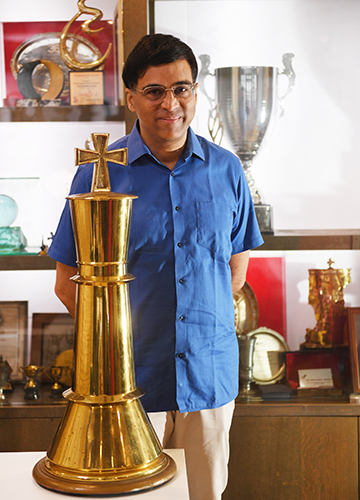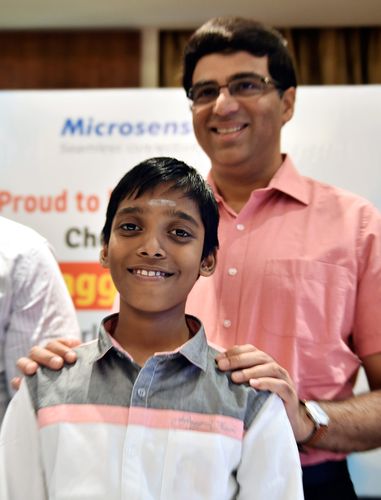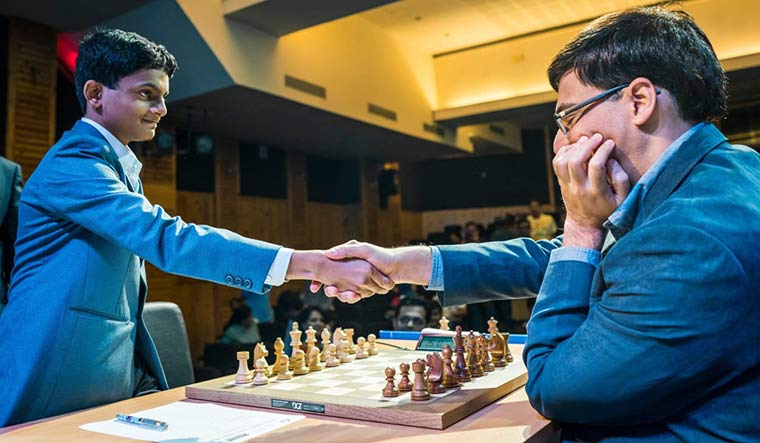Viswanathan Anand is back home in Chennai after a hectic tour to promote the Chess Olympiad that Mahabalipuram will host from July 28 to August 10. He also recently played the Leon Masters in Spain, which included a field of Boris Gelfand, Andrey Esipenko and Jaime Santos.
That is Anand at 53; he picks and chooses events, with enjoyment being the main criteria. He is not ready yet to retire, but he now has other chess-related things to do and enjoy. One of these was setting up the Westbridge Anand Chess Academy, where he mentors some of India’s most promising talents. He is currently world number 13, but rankings do not matter to him anymore. He now wants to ensure that the next wave of Indian chess players breaches the top 10; the highest-ranked Indian after Anand, right now, is P. Harikrishna at 25. In an exclusive interview with THE WEEK, Anand looks at the chess he is currently playing, the next generation of Indian players, his plans for the coming years and the different demands on his time. Excerpts:
Q/ How has the work-from-home life been, and how are you choosing which tournaments to play in?
A/ The two are not related. I am working from a room at home; I was doing the same in Europe. I moved back from Europe 12 years ago. What happened is, close to my 50th birthday, I gave some thought to how I saw my career going forward and I thought it might be a good idea to play a little bit less and look at pursuing some other things. This was not entirely accidental; the pandemic happened and there was an enforced break.
During the pandemic, a lot of other activities happened; I did some online training and finally started the Westbridge Anand Chess Academy.
The pandemic felt like a dry run for something I had been thinking about vaguely. In 2019, it already felt like a waste of time playing the World Cup and the Grand Swiss (both part of the qualification cycle for the World Championship). But, of course, when I got the invitation to play in the Grand Chess Tour in Warsaw and then Zagreb, in 2021 and 2022, I was very happy. When I get a good invitation to play somewhere, I like to play it and I prepare quite hard for it. But beyond that, I now have time for other projects. First, I was able to do commentary for the World Championship. I was also able to accept the offer of Mr [Arkady] Dvorkovich (FIDE president) to be on his team as deputy president.
Q/ How do you choose the tournaments that you want to play in?
A/ Simply tournaments that I like playing. I like the Grand Chess Tour—they organise the events well; the rapid and blitz were nice there. Norway [Chess], again, was nice. I will play Lyon now. I do not try to get to the World Championship because that is too many stages and I do not want to go down that [path].
Q/ Is the World Championship chapter over?
A/ Yeah, it is closed. I am not even going to try to play there so there is no question of winning it. It is such a long and arduous goal—[you have to] first qualify for it, play and win the Candidates, and even if the first stage goes very well, then you would need to train very hard. I do not think it is worth it any more.
Q/ So you are no longer affected by rankings and ratings when you enter a tournament?
A/ No, every tournament is rated, but the point is, in the World Championship... I have won it five times. That is enough. I need to move on.
Q/ In India, there is so much demand on your time. Does it get to you?
A/ I was doing a certain amount of it anyway, and clearly with something like the Olympiad happening in Chennai, there will be more occasions to celebrate and promote it. It is a question of planning—you have to make sure you have time for things that you really want to do.
Q/ When you go to big events now, do you feel undercooked because you are coming off a break?
A/ You have no idea till you start playing whether you are in shape or not. I have been lucky that I was successful in the tournaments in Zagreb, Warsaw and Norway. I would probably feel differently if I had not been successful (smiles). That is the risk you have to live with.
Being a professional through the year requires blocking everything else. You have to live with developments in chess theory, constantly thinking of chess, and that is not something I wanted to do anymore. It is a nice transition phase and we will see where it gets me.
Q/ How is the family taking it? You are around much more now.
A/ They are seeing me much more than before.
Q/ Are they happy about that?
A/ (Laughs) You have to ask them! Of course, it is nice that we are able to spend lot of time as a family. I am here much more because I do not have a full calendar.... That does not mean I am not competitive. When I play I am very paranoid.
Q/ Describe a day in your life when you are at home.
A/ Nothing has changed as such. When I am thinking about chess I think about it a lot, but when I have other commitments I am able to block (chess) out for a couple of days. I am only skimming through the corner of my eye. When I get back home, I will block a day and see what has happened [in the chess world]. That has been the situation for the past 10 to 12 years. Since we moved back and Akhil was born, there are days when I do not think about chess at all.
Q/ When you are prepping for a tournament, are the intensity and the training same as before?
A/ The intensity was never a problem; whether the results work out the way you want is the problem. You can train hard and it can fall flat. It does not mean your training was wrong, it just means it did not hit its mark. Equally, you can be lucky in tournaments. I am not so out of touch with the game. Even when I am working with the youngsters at the academy, I am following developments. So, when the time comes for me to work again, at least I have a starting point.
Q/ How would you describe this phase of your career?
A/ It is satisfying in a totally different way. Sport is like a treadmill; one day when you get off, you realise there is nothing wrong in getting off. I see it in [Veselin] Topalov also; he played in Norway, he knew there will be four months where he will not play, and he is at peace with it. Same with me.
Q/ Have you done post-mortems of your matches against Magnus Carlsen?
A/ Not at all. It was not practical to sit and do that. Unless there is a match with him, there is no need to do that. And anyway, there is no getting away from the fact that even before I played him I had passed my peak and he was entering his. He is not the only player I have to work quite hard to compete with; there are others like Hikaru [Nakamura], Fabiano [Caruana], Wesley [So]...
Q/ You nearly beat him in Norway Chess this year. What do you put down these close losses to?
A/ I do not. There are mistakes that happen. It is frustrating, but you keep trying to get better. When you are not playing regularly, you do not know what to expect. It was one of the biggest misses I have had against him.
Q/ Do you think you are near a win?
A/ I do not know. The youngsters are getting stronger and, every year, I am maybe not getting stronger.
Q/ Is there still a lot of self-flagellation after a loss?
A/ Of course! I do not sleep well that night.
Q/ How has the experience of mentoring young players been?
A/ They already have their setups and trainers. But I thought I could give them classes with my trainers in areas that should be covered.
I feel proud that since we started with them, they have gained 100 to 120 points. [D.] Gukesh and Arjun [Erigaisi] are around 2690 (Gukesh reached 2703.9 on July 17); Pragg (Praggnanandhaa) is beating Carlsen and [Liren] Ding (world no. 2). He is not playing rated tournaments right now, but it will show when he does. One of the goals we define for ourselves is that India should be well represented in the top 10, and I think we are getting there.
Q/ How close are we to achieving this?
A/ Two of them are close to 2700. I think Pragg might be a year of good results away; Nihal slightly more. Raunak [Sadhwani] and Leon [Mendonca] can add a year to that. 2700 is a good starting point. Top 10 is about two to three years away, or longer, because there is a lot of competition in the junior stage.
Q/ What is it about these bunch of Indian youngsters that excites you?
A/ They are not people who exclusively grew up on computers. In fact, Gukesh refused to use computers initially, saying “I will only use the chess board and not the search engines”. Praggnanandhaa as well. It is a false binary that computers give you accurate information. What human games gave in the past was that, if there was a weak opponent, you were able to see how the stronger player was able to execute his plan. This was nice learning material. It is harder when both sides play perfectly because neither is able to show its plan.
Q/ Could you share one standout point about each of these youngsters?
A/ Arjun is a phenomenal calculator. That is his strongest point. Gukesh is very hard-working, courageous, takes very good openings and fights with anyone well. Praggnanandhaa is spirited; even when a tournament is going very badly he is trying to win every game. Raunak and Nihal [Sarin] are especially very fast in time controls. Nihal... is a highly evolved player. His style looks like [it is] of someone who has been around longer. Raunak has got a bit more devilry to him; maybe it is not an accident that his nickname is ‘Devil’.
Mendonca is younger, but you can see this sheer passion. At times I would tell him to take rest but he would just go to the next tournament. And Vaishali, Pragg’s elder sister, is sincere and hard-working. You give her a task and she will sit and work at it. She has a lot of potential.
Q/ How prepared are you to take on administrative work with FIDE?
A/ There will obviously be a learning curve, but I look forward to making a positive contribution to Arkady Dvorkovich’s team. He and his team have stabilised FIDE and its reputation, and built up its finances and relations with many sponsors. That is a solid base to build on.
Q/ Are you eventually looking at a full-fledged role in administration?
A/ I do not know yet. I want to help the team. If we win [the elections], I will be working full-time on this project with FIDE. But I will also play a couple of invitational events.
Q/ So you are not ready to give up playing entirely?
A/ I think in five or six years I might want to stop completely, but we will see.
Q/ How do you see the Olympiad making a difference to Indian chess?
A/ It does not substitute for results, but it will put a spotlight on chess for two to three weeks. We need these big events that capture people’s attention every few years. Even my World Championship events will fade in memories eventually.




